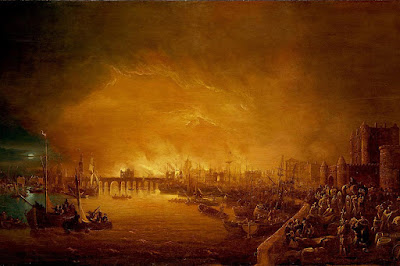Lately a new feature has been added to Improvised Radio Theatre. In “A Gameable Age” Mike and Roger take a deep dive into a historical period that’s ripe for roleplaying. As a culture gamer that sort of thing is right up my street, or winding country lane rather. And it was particularly interesting that they launched this segment with discussions of the English Civil War and the Restoration, because a few years ago I had a notion to set a Legend campaign in a setting not unadjacent to that period.
My idea was to have the characters in Ellesland, but a version of Ellesland resembling our 17th century. Twenty years earlier, in their youth, they had been involved in a bitter civil war that still left scars on society. The players were separately asked which side they had supported, the revolutionaries or the crown. After an interregnum the king had been restored and now we were in a period of reconciliation – in theory.
The point of the game being to play tricks with memory, I envisaged the civil war years as more like the early medieval world of traditional Legend as seen in Dragon Warriors. If a character turned their mind to how twenty years had wrought such changes in society and technology (no sign of pistols or muskets back in the civil war, for example) they’d find the details hazy. Something more earth-shattering than victory or defeat had happened – because, after all, the loss of your twenty-year-old self is an apocalypse. That’s how I intended to characterize the Doomsday of the year 1000 that is supposed to bring an end to Legend.
I realize now that this is a case of parallel development with Kazuo Ishiguro’s The Buried Giant, which I have variously praised, cavilled about, and neutrally assessed. In a world where magic is real and Parliament is now the seat of sovereignty, an Act of Oblivion has the force of physical law. Such supernaturally induced amnesia allows the characters to forget old vendettas and live in peace. (Hmm, in hindsight, instead of using the idea for a roleplaying campaign, maybe I should’ve written it up as a novel.) If you want to read about it in detail you’ll need to sign up for my Patreon page, but this post gives you the gist of it.
- Act of Oblivion by Robert Harris
- The English Civil War: A People’s History by Diane Purkiss
- The Fall: Last Days of the English Republic by Henry Reece
- Providence Lost: The Rise and Fall of Cromwell's Protectorate by Paul Lay
- Republic: Britain’s Revolutionary Decade, 1649–1660 by Alice Hunt
- The Restless Republic by Anna Keay
- The Time Traveller's Guide to Restoration Britain by Ian Mortimer








